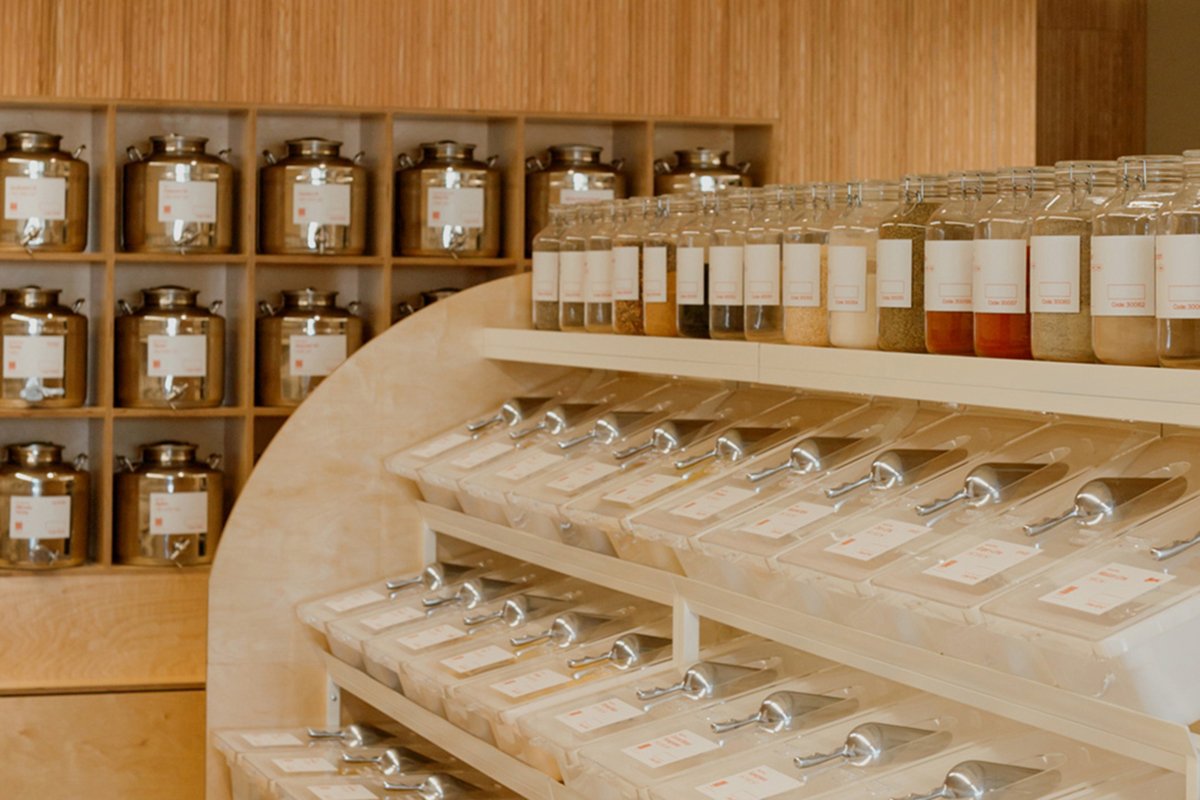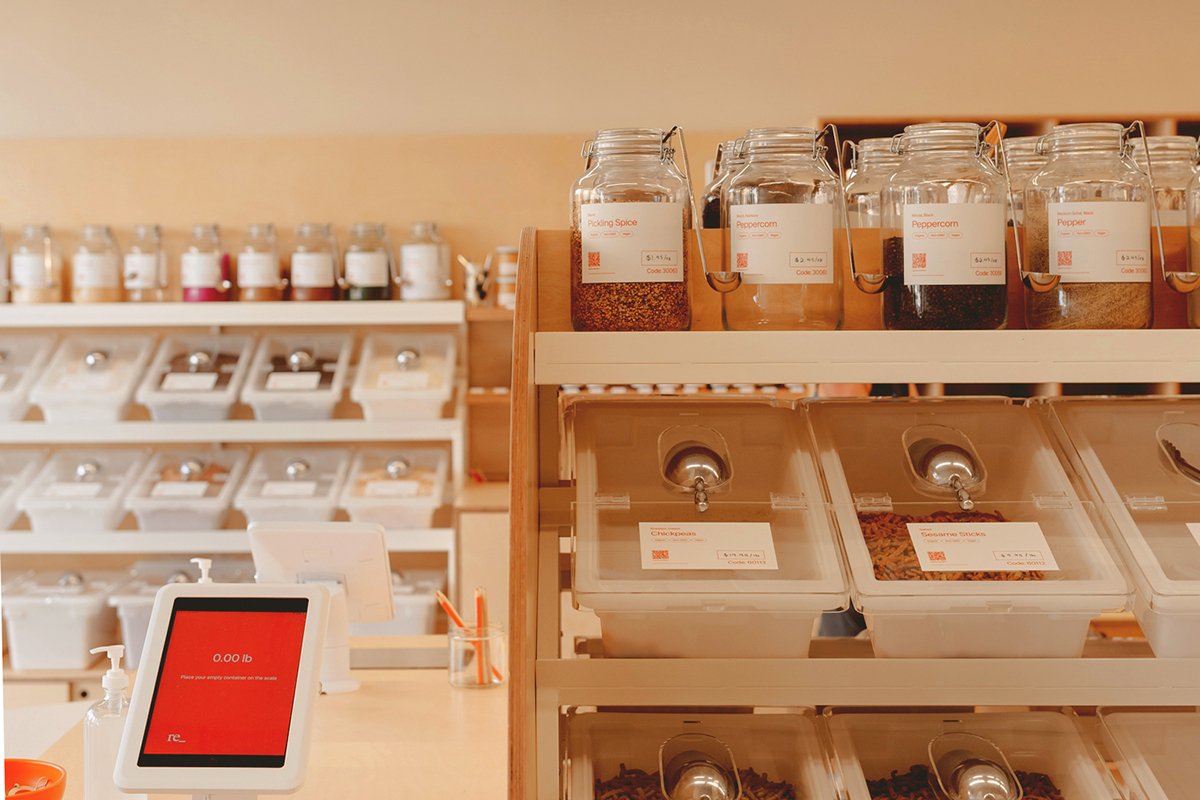Food packaging is a significant contributor to the plastic pollution crisis. These stores offer shoppers an alternative.

Food packaging is a significant contributor to the plastic pollution crisis. These stores offer shoppers an alternative.
June 10, 2024

Inside a re_ grocery store in the Mar Vista neighborhood of Los Angeles. (Photo courtesy of re_grocery)
A version of this article originally appeared in The Deep Dish, our members-only newsletter. Become a member today and get the next issue directly in your inbox.
As a barista in San Francisco for almost a decade starting in 2007, Joseph Macrino hated all of the waste the coffee shop produced—the disposable cups, the lids, the sleeves. He’d give his regulars grief for not bringing in their own mugs.
“I’d be like, ‘Bring your own cup! I see you every day, you get the same drink. I can still do a pretty rosetta or heart on top of your latte, but bring your own cup. It’s such a waste!’” Macrino said.
When he moved to Los Angeles in 2016, he and his then-partner decided to open up the city’s first zero-waste grocery shop. Drawing inspiration from the bulk-food-heavy Rainbow Grocery Co-op, one of their favorite haunts in San Francisco, they opened the doors of re_grocery on Earth Day in 2020.
“I really want to change people’s thinking around grocery shopping, around sustainability, around consumerism, around capitalism, thinking about how we can leverage our goals and principles but still run a profitable company.”
From neat bins, glass jars, and metal canisters, the certified B-Corp offers more than 500 refillable bulk goods including snacks, seeds and nuts, coffee and tea, oils and vinegars, cereals and grains, household items, and bath and body products. The store purchases in buckets and other containers they can return to the supplier for refill or recycle, and customers can bring in their own containers or cloth bags to stock up, or get reusable containers from the store.
In traditional grocery stores, plastic holds everything from apples to trail mix to detergent to water. “Plastic packaging is ubiquitous,” said Celia Ristow, who launched the zero-waste blog Litterless in 2015. (The site is down now, but will be back up this summer, she said.) “It’s cheap, it’s lightweight, if you need to ship, it’s non-breakable. So, there are some real advantages that you have to overcome.”
Yet given some of the shocking statistics—that 95 percent of plastic packaging is disposed of after a single use, that only 9 percent of the plastic ever produced has actually been recycled, and that 72 percent of plastic ends up in landfills or the soil, air, or water—some are trying to figure out how to sell food in a way that prevents plastic from being produced in the first place.
Since opening the first shop in Highland Park, Macrino has opened two additional re_grocery locations in L.A.—and has diverted 500,000 packaging items from the landfill. He would like to continue expanding, eventually to around 10 stores throughout L.A. and then more beyond that. And while the store currently offers delivery throughout the city and the shipping of non-perishables nationwide, he’s currently working to launch the shipping of bulk items nationwide as well, using compostable, biodegradable packaging.
“I really want to change people’s thinking around grocery shopping, around sustainability, around consumerism, around capitalism, thinking about how we can leverage our goals and principles but still run a profitable company,” Macrino said. “It can be done—we’re doing it. But I want to make it bigger than this.”
The first iteration of minimal packaging in stores was the extensive bulk sections in the hippie food stores of the 1960s and ’70s, said Ristow, who currently works as the certification manager for the Total Resource Use and Efficiency (TRUE) zero-waste certification. TRUE is offered by Green Business Certification Incorporated (GBCI), the same agency that oversees LEED and other green rating systems.
The second iteration—stores like Macrino’s, which produce little to no waste at all—have taken hold over the last few years, Ristow said. When she began tracking zero-waste and refillery stores in 2015, there were fewer than 10 in the U.S. “It started to explode over the next five years,” she said.

Inside a re_ grocery store in the Studio City neighborhood of Los Angeles. (Photo courtesy of re_grocery)
While California and New York are hotspots for zero-waste grocery stores, Ristow also sees them in more unexpected places, like small towns and rural areas, in states like Ohio and Wisconsin. “As this movement took off, the people who started these stores were ordinary citizens. It wasn’t a centralized movement. People said, ‘I think my community needs it,’ and so they began opening them where they lived,” Ristow said.
Larasati Vitoux, originally from France, opened the zero-waste grocery store Maison Jar in Greenpoint, Brooklyn, two years ago. European countries are generally at the forefront of efforts to reduce and recycle, and the zero-waste grocery store movement is much more developed there than in the U.S. After visiting her parents in Orléans, France, early in the pandemic, Vitoux noted that their relatively small town, with a population of just over 100,000, supported five zero-waste grocery stores. Meanwhile, in the entire city of New York, with a population of 8.3 million, Vitoux knew of only one, called Precycle.
She saw an opportunity and started to put together a business plan. Her community—home to many young families—immediately embraced her. Eighty percent of her customers are return shoppers, and most live within a 10- to 15-minute walk. “We opened in March 2022, and by the end of the year, for the holidays, we received a lot of cards from people telling us that we were the best thing that happened to the neighborhood that year,” she said.
The business started making money within six months of opening, Vitoux said, and year-over-year sales increased by 50 percent between the first quarters of 2023 and 2024. Additionally, as of their second anniversary in March, the store had sold—in bulk—the equivalent of 1,420 bottles of olive oil, 1,820 jars of nut butters, 762 plastic-packed blocks of tofu, and 2,443 bottles of kombucha.
In addition to offering local and organic food without packaging, plus perishables like fruit and vegetables, eggs, and bread, Vitoux aims to promote a sense of community around ideas of sustainability. The store has hosted a soap-making workshop, speakers on climate change and eco-anxiety, vendor popups, and happy hours, where all items are 20 percent off for a two-hour stretch. (These are very popular, she said.) Maison Jar is also an electronic waste and battery drop-off location and serves as a pickup location for Green Gooding, New York’s first circular economy rental system, which offers people access to small appliances like air fryers, juicers, and popcorn makers.
As she continues building her business, Vitoux is working toward a TRUE zero-waste certification offered by GBCI. “It’s a lot of work, but it’s important to have a third-party certifier say you’re doing things the right way,” she said.
There are, however, a number of challenges to operating a zero-waste grocery store.
“I think the hardest part about it is the consumer wants Costco prices from their local mom-and-pop shop,” Macrino said. “For people owning a small business, it’s hard to compete against those humongous companies.” Re_grocery tries to pass on to consumers the savings that comes from sourcing in bulk. “We’re really trying to be competitive with our pricing as best as we can,” he said. “But there’s not a lot of options for us to choose from. We really are always looking for other suppliers to give us better competitive pricing.”
For Vitoux, New York City rent is very high, and because cleaning and refilling the bulk containers is work-intensive, she also has to invest a lot in her workforce. Plus, because the number of package-free stores in the U.S. is still relatively small, systemic supports like the ones present in her home country do not exist.
In France, after package-free stores started booming in the early 2010s, she said, the government developed rules and regulations for hygiene and sanitization to govern them. Additionally, a zero-waste business association offers training and support to store owners and supply chains for bulk products developed because of the increased demand. (The movement’s ideals are taking hold in the mainstream as well, she said: By 2030, the French government is requiring that grocery stores of more than 4,300 square feet devote at least 20 percent of their sales area to bulk items.)
“The trend in Europe, it was really kind of a grassroots-type of growth and then regulation and supply chain followed,” Vitoux said. “I think it could happen here.”
Ristow sees the bulk aisles of traditional grocery stores as a good option for people looking to cut down on waste without access to a full-on zero-waste shop. At the same time, she hopes that as the package-free grocery movement grows, stores will continue to “invest in the idea of being community sustainability hubs” and will also “find ways to welcome in a larger demographic, maybe people who are more price conscious or need to shop with benefits.”
Some of the most important work these stores are doing, she said, is developing an alternative model to traditional, plastic-heavy grocery stores. “We have to find alternatives that work before we can scale them,” she said.
Macrino, for his part, is committed to figuring out how to scale. “My goal now is how am I going to get this thing so big that I can get a store in every major city and really make a real impact sustainably?” he said. “I think it can be done. And I think we have the tools to do it.”
Ultimately, he hopes for a cultural shift. “Everyone needs to take a step back and think, ‘These short-term instant gratifications are really piling up, and we really need to rethink how we’re operating.’”

October 9, 2024
In this week’s Field Report, MAHA lands on Capitol Hill, climate-friendly farm funding, and more.
October 2, 2024

October 2, 2024

October 1, 2024

September 30, 2024

September 25, 2024

September 25, 2024

Like the story?
Join the conversation.